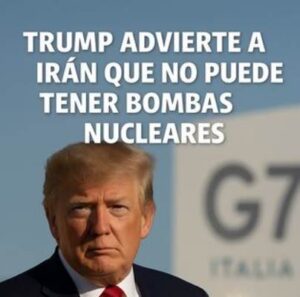
Infocid. Redacción Internacional – Resumen 17 de junio de 2025
El presidente de Estados Unidos, Donald Trump, abandonará anticipadamente la cumbre del G7 en Canadá esta noche para “atender asuntos urgentes”, según informó su secretaria de prensa, Karoline Leavitt. La decisión responde al rápido deterioro de la situación en el Medio Oriente, especialmente el conflicto entre Irán e Israel, en el cual Washington desempeña un papel cada vez más visible.
Desde el inicio de los ataques israelíes, Trump ha mantenido un tono severo hacia Irán, reiterando que «IRÁN NO PUEDE TENER UN ARMA NUCLEAR». En su red Truth Social, el presidente publicó una advertencia inusual: “Todos deben evacuar Teherán de inmediato”, una declaración que, según fuentes de la Casa Blanca citadas por CNN, tiene la intención de presionar al régimen iraní para que regrese a la mesa de negociaciones.
Aunque Trump ha mostrado apoyo general a Israel, ha evitado un respaldo absoluto a sus acciones más arriesgadas. Según reportes diplomáticos, ha pedido a Israel que evite atacar al líder supremo iraní, Ali Jamenei, en un intento de frenar una escalada que podría arrastrar a Estados Unidos directamente al conflicto.
Mientras tanto, las fuerzas israelíes lograron establecer superioridad aérea sobre el oeste de Irán, incluyendo Teherán, en menos de 48 horas, algo que Rusia no ha podido lograr en Ucrania tras más de tres años de guerra. Las fuerzas israelíes destruyeron baterías antiaéreas y bombardearon infraestructura militar, en una ofensiva que representa un despliegue de precisión y dominio tecnológico aéreo, según analistas citados por The Wall Street Journal.
En el terreno, se han registrado explosiones en Teherán y se activaron sistemas de defensa aérea en Natanz, lugar clave del programa nuclear iraní. El gobierno de Israel había pedido previamente a la población evacuar ciertas zonas del noreste de Teherán, lo que coincide con la advertencia de Trump desde Canadá.
Por su parte, el ministro de Relaciones Exteriores iraní, Abbas Araghchi, desafió a Trump, afirmando que si quiere realmente detener la guerra, «le bastaría una llamada para frenar a Netanyahu», en referencia a la plena coordinación entre Estados Unidos e Israel reconocida por ambos gobiernos. Araghchi advirtió que una implicación directa de EE.UU. “destruiría cualquier posibilidad de solución diplomática”.
En Washington, el secretario de Defensa Pete Hegseth anunció el despliegue de «capacidades adicionales» al Comando Central (CENTCOM), reforzando la presencia militar estadounidense en Medio Oriente para “proteger a nuestras fuerzas” ante la creciente tensión.
Finalmente, se ha informado que Trump no firmará la declaración final del G7 sobre Irán e Israel, por considerar que el lenguaje es “demasiado débil” y que se debe actuar con mayor firmeza. La decisión marca una clara ruptura con algunos aliados europeos que promueven la desescalada.
La situación se intensifica con rapidez. Trump ya anunció: “Tan pronto como salga de aquí, vamos a hacer algo”. Lo que está en juego no es solo el equilibrio regional, sino el papel de Estados Unidos en una nueva fase de conflicto en Medio Oriente.
🇺🇸 Trump Leaves G7 Early to Confront Iran Crisis: “IRAN CAN NOT HAVE A NUCLEAR WEAPON”
By Infocid International Desk – June 17, 2025
U.S. President Donald Trump is cutting his visit to the G7 summit in Canada short, citing urgent matters in the Middle East. According to White House Press Secretary Karoline Leavitt, Trump will depart after dinner with other heads of state to address the fast-developing Iran-Israel conflict.
In a bold message posted on Truth Social, Trump declared: “AMERICA FIRST means many GREAT things, including the fact that IRAN CAN NOT HAVE A NUCLEAR WEAPON. Everyone should immediately evacuate Tehran!” A White House source later clarified to CNN that the message was meant to pressure Iran back into negotiations, not to signal imminent U.S. military action.
Behind the scenes, Trump is walking a tightrope. While publicly aligned with Israel’s right to defend itself, the president has reportedly advised Israeli officials to avoid targeting Iran’s Supreme Leader, Ali Khamenei, in order to prevent uncontrollable escalation. Despite this, Israeli Prime Minister Benjamin Netanyahu confirmed that military operations are “fully coordinated” with Washington.
Meanwhile, Israel has rapidly gained air superiority over western Iran, including the skies over Tehran, within just 48 hours of launching its campaign. Analysts compare this achievement with Russia’s failed attempt to control Ukrainian airspace after more than three years of war. According to the Wall Street Journal, Israeli forces have taken out dozens of Iranian air defense systems and begun precision strikes using F-35s and F-15s directly from within Iranian territory.
Iranian state media has reported multiple explosions in Tehran, and air defenses have been activated in Natanz, a key nuclear facility. No casualties have been reported so far from the latest missile exchanges, although some injuries occurred as civilians sought shelter.
Iran’s Foreign Minister Abbas Araghchi responded sharply on social media, claiming: “If President Trump truly wants peace, it takes one phone call to muzzle Netanyahu.” He warned that deeper U.S. involvement would “destroy any prospect for a negotiated solution.”
In Washington, Defense Secretary Pete Hegseth announced the deployment of “additional capabilities” to the CENTCOM area of responsibility, which includes the Middle East. “Protecting U.S. forces is our top priority,” Hegseth stated, emphasizing a heightened defensive posture.
Despite the intensifying conflict, reports indicate Trump will not sign the G7’s final statement on Iran and Israel, which calls for de-escalation and the protection of civilians. Sources close to the president say the document’s language is “too weak,” and Trump believes stronger action is required.
Speaking briefly to reporters, Trump said, “As soon as I leave here, we’re going to be doing something.” Though vague, his words suggest imminent decisions that could reshape the U.S. role in the Middle East conflict.
With Trump returning to Washington tonight, the world watches closely. What happens next may define not only the course of the Israel-Iran war—but also America’s posture in an increasingly unstable region.

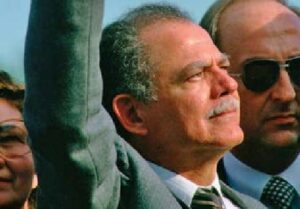

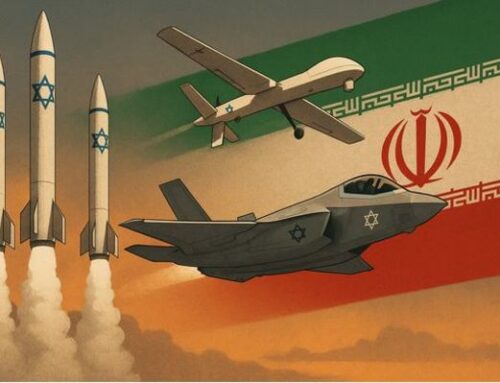


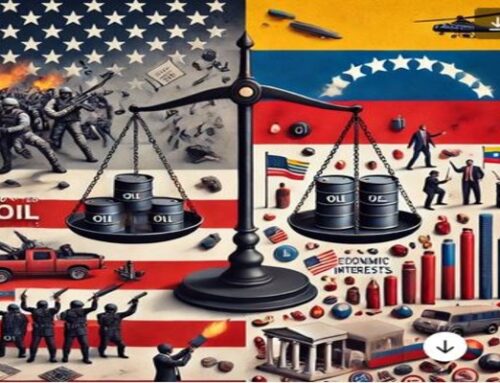
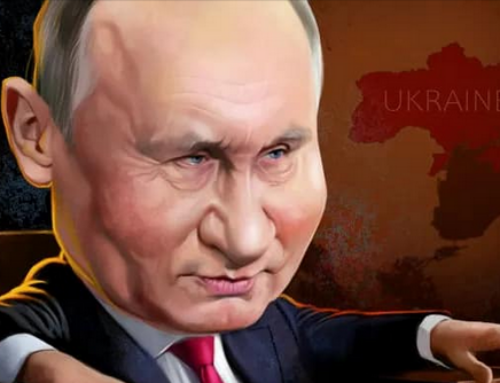
Deja tu comentario